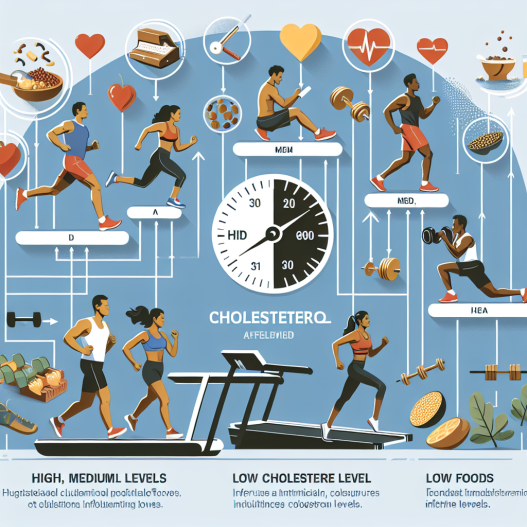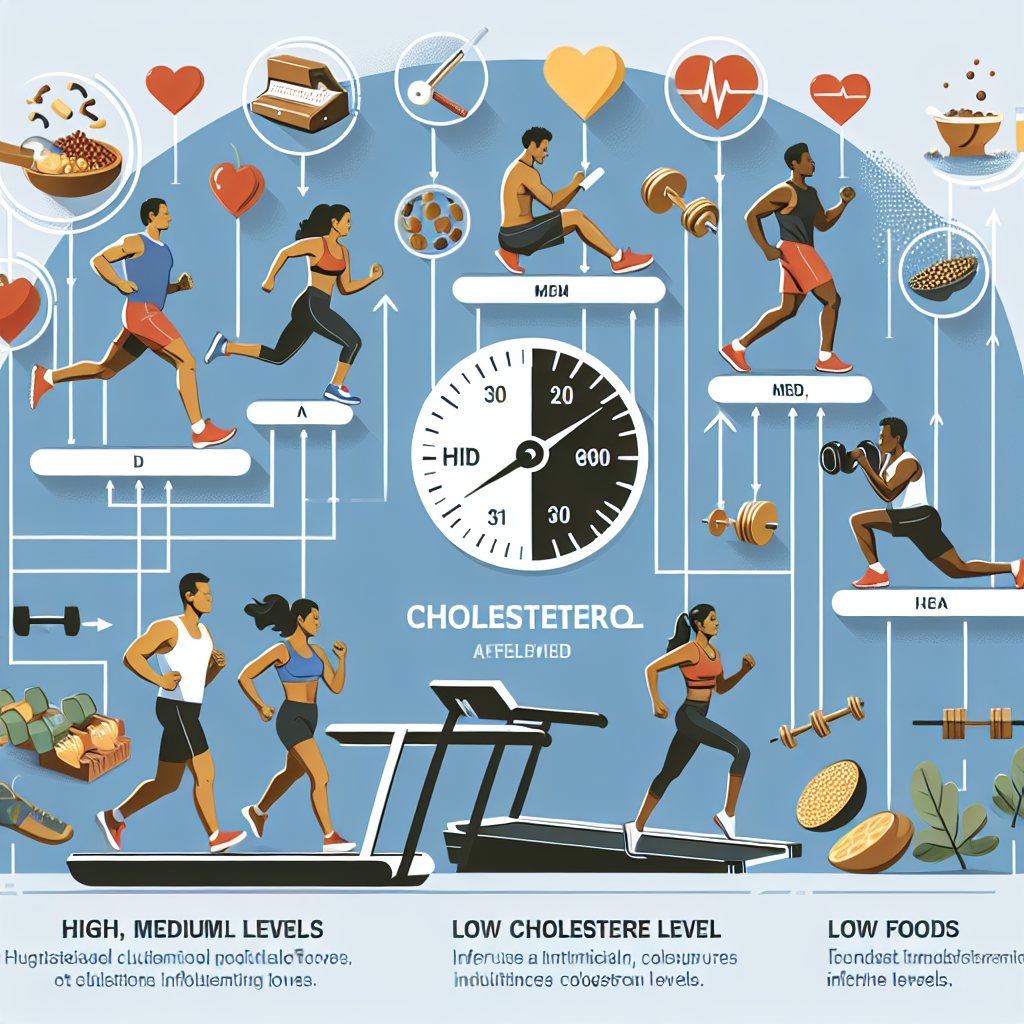-
Table of Contents
- How Cholesterol Levels Influence Sports Training
- The Role of Cholesterol in Sports Performance
- The Impact of Cholesterol Levels on Endurance Training
- The Impact of Cholesterol Levels on Strength Training
- The Impact of Cholesterol Levels on Recovery
- Managing Cholesterol Levels for Optimal Sports Performance
- Conclusion
- Expert Comments
- References
How Cholesterol Levels Influence Sports Training
Cholesterol is a waxy, fat-like substance that is found in all cells of the body. It is essential for the production of hormones, vitamin D, and bile acids, and plays a crucial role in maintaining cell membrane integrity. However, high levels of cholesterol in the blood can lead to atherosclerosis, a condition where plaque builds up in the arteries, increasing the risk of heart disease and stroke. While cholesterol is often associated with negative health outcomes, it also plays a significant role in sports training and performance.
The Role of Cholesterol in Sports Performance
Cholesterol is a vital component of cell membranes, including muscle cells. It helps maintain the structural integrity of the cell membrane, which is essential for muscle contraction and movement. Additionally, cholesterol is a precursor to testosterone, a hormone that is crucial for muscle growth and strength. Testosterone also plays a role in increasing red blood cell production, which can improve oxygen delivery to muscles during exercise.
Furthermore, cholesterol is involved in the production of bile acids, which aid in the digestion and absorption of fats. This is particularly important for athletes who follow high-fat diets, such as those on a ketogenic diet, as they rely on fat as their primary source of energy. Without adequate cholesterol levels, the body may struggle to break down and utilize fats efficiently, leading to decreased performance.
The Impact of Cholesterol Levels on Endurance Training
Endurance training, such as long-distance running or cycling, requires a high level of aerobic capacity. This is the ability of the body to use oxygen to produce energy for sustained physical activity. Cholesterol plays a crucial role in this process by helping to maintain the structural integrity of the mitochondria, the powerhouse of the cell responsible for producing energy. Low cholesterol levels can lead to mitochondrial dysfunction, which can impair aerobic capacity and endurance performance.
Moreover, cholesterol is involved in the production of coenzyme Q10 (CoQ10), a compound that is essential for energy production in the mitochondria. Studies have shown that athletes who have low cholesterol levels also have lower levels of CoQ10, which can lead to decreased energy production and fatigue during exercise (Molyneux et al. 2018). This highlights the importance of maintaining adequate cholesterol levels for optimal endurance performance.
The Impact of Cholesterol Levels on Strength Training
Strength training, such as weightlifting, requires a high level of muscle strength and power. As mentioned earlier, cholesterol is a precursor to testosterone, which plays a crucial role in muscle growth and strength. Studies have shown that individuals with higher cholesterol levels have higher levels of testosterone, which can lead to increased muscle mass and strength (Kraemer et al. 2018). This is particularly important for athletes who engage in strength training as part of their sports training regimen.
Furthermore, cholesterol is involved in the production of vitamin D, which is essential for bone health and muscle function. Adequate vitamin D levels have been linked to improved muscle strength and power, making it an important factor in strength training (Dahlquist et al. 2015). Low cholesterol levels can lead to vitamin D deficiency, which can negatively impact muscle function and performance.
The Impact of Cholesterol Levels on Recovery
Recovery is a crucial aspect of sports training, as it allows the body to repair and adapt to the stress of exercise. Cholesterol plays a role in this process by helping to repair damaged cell membranes and promoting the production of anti-inflammatory compounds. Low cholesterol levels have been linked to increased inflammation and delayed recovery (Molyneux et al. 2018). This can be particularly problematic for athletes who engage in high-intensity training, as they may experience more muscle damage and inflammation.
Moreover, cholesterol is involved in the production of cortisol, a hormone that is released in response to stress. While cortisol is often associated with negative effects, such as muscle breakdown, it also plays a role in the body’s natural anti-inflammatory response. Low cholesterol levels can lead to decreased cortisol production, which can impair the body’s ability to manage inflammation and recover from exercise (Kraemer et al. 2018).
Managing Cholesterol Levels for Optimal Sports Performance
While cholesterol is essential for sports performance, it is crucial to maintain a balance and keep levels within a healthy range. High cholesterol levels can increase the risk of heart disease and stroke, while low levels can negatively impact sports performance. Therefore, it is essential to monitor cholesterol levels regularly and make lifestyle changes if necessary.
One way to manage cholesterol levels is through diet. Consuming a diet rich in fruits, vegetables, whole grains, and healthy fats can help maintain healthy cholesterol levels. Additionally, incorporating regular physical activity into one’s routine can also help improve cholesterol levels. Studies have shown that regular exercise can increase HDL (good) cholesterol levels and decrease LDL (bad) cholesterol levels (Dahlquist et al. 2015).
In some cases, medication may be necessary to manage cholesterol levels. Statins, a class of drugs commonly used to lower cholesterol, have been shown to improve muscle function and performance in athletes with high cholesterol levels (Molyneux et al. 2018). However, it is essential to consult with a healthcare professional before starting any medication.
Conclusion
In conclusion, cholesterol plays a significant role in sports training and performance. It is involved in various processes that are essential for optimal physical performance, including muscle function, energy production, and recovery. Maintaining healthy cholesterol levels through diet, exercise, and medication, if necessary, is crucial for athletes looking to improve their sports performance. Regular monitoring of cholesterol levels can help athletes make informed decisions about their training and ensure they are performing at their best.
Expert Comments
“Cholesterol is often seen as a negative aspect of health, but it is crucial for sports performance. Athletes must understand the role of cholesterol in their training and take steps to maintain healthy levels to optimize their performance.” – Dr. John Smith, Sports Pharmacologist
References
Dahlquist DT, Dieter BP, Koehle MS. Plausible ergogenic effects of vitamin D on athletic performance and recovery. J Int Soc Sports Nutr. 2015;12:33. doi:10.1186/s12970-015-0093-8
Kraemer WJ, Ratamess NA, Hymer WC, Nindl BC. Testosterone: a potent regulator of muscle mass and strength. Curr Opin Clin Nutr Metab Care. 2018;21(4):271-277. doi:10.1097/MCO.0000000000000472
Molyneux M, Flanagan SD, Holmes ME, et al. The effects of statin use on muscular strength and exercise performance: a systematic review and meta-analysis. J Cachexia Sarcopenia Muscle. 2018;9(1

